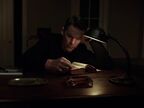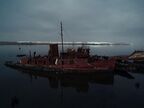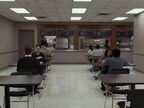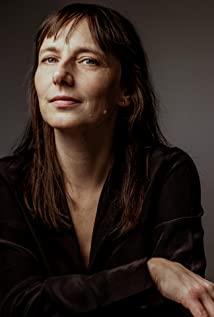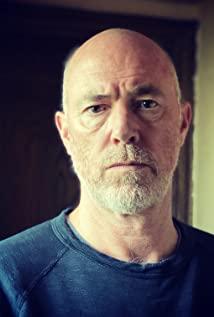We have good reason to believe that Paul Schrader’s "First Reformed Church" was followed by Bresson’s "Diary of a Country Priest". First, what appeared on the screen was a small cross, looming, and then showing After the empty shot of the church, the priest opened the diary, and the voiceover began to narrate.
A similar narrative style appears in The Diary of a Country Priest. Bresson adopted a huge cross as the ending. In Bresson’s era, the desperate priest could embrace God at the last moment as a proof of God’s existence, but Until the postmodern context of "First Reformed Church", for the priest Toller played by Ethan Hawke, in the increasingly pathological heterogeneous wasteland, and in the face of the trauma of a war that occurred outside the time of the film , That cross can only be crumbling if there is nothing.
(1) Transcendental style and image gospel
"Transcendent" comes from a term in the sense of religion and philosophy, which proves the presence of the divine Other, whose existence transcends the cognitive boundary of human beings. "Transcendent" cannot be recognized but can only be realized through perception.
Schrader is not only a film director, but also has multiple identities as a screenwriter and film critic. Through the book "The Transcendental Style of Film", he analyzed the image styles of Bresson, Dreyer, and Ozu Yasujiro to "transcend the "Introduced into the field of film.
We cannot call Hollywood’s "Ten Commandments", "Pharaohs and Gods" and other religious epic dramas "transcendent", because everyone knows that the miracle here was born in a certain studio or CGI's man-made magic; "Transcendent" comes from the inside of the act of viewing. Observation is the observation of apparent things, a pure act of viewing, or called "pure audiovisual images" in Deleuze's theory; whether it is Bresson’s minimalism Doctrine, or Ozu Yasujiro caring about ordinary things with a fixed low-position lens. They are all abandoning cognition and reducing the spectacle in the audience. They are just "Dasein" and "behavior" and cannot share the psychological world of the role with the audience or the actors. (The latter is achieved through de-performation), not to mention racking your brains to imagine an unexpected ending-because these endings are already doomed, or have enough hints.
But they do not belong to the category of realism. The excessive attention to appearance belongs to the ultimate sense of form, and the negation of what is seen in the flow of time-this road leads to the proof of the existence of unknowable divinity.
Schrader summed up the ways of constructing transcendental movies: daily life, alienation and contemplation, which can be the three entrances into the spiritual core of "First Reformed Church".
The daily film takes place from the daily sermon of the parish priest Toller. He repeats the "food of life, the cup of relief" to every church member, and continues to pay attention to his daily life: deteriorating health status, hosting youth rescue activities, Introduce the history of the church to the children, and prepare for the 250th anniversary of the church. Micheal's extreme view is that the death of this person is just one aspect, and other factors have led the pastor to his demise.
Alienation As a pastor who lives by spreading his beliefs, he must endure the inability to communicate; he cannot spread the gospel to the extreme Micheal, nor can he use "faith" to give a methodology for the environmental problems Micheal raised with some data .
As his black boss said: he should "come out"; similarly, he must also face the doubts of members of the Youth Relief Society: "Is Christianity designed for the losers?"
He is alienated from the secular meaning of this community or church, and at the same time, he is also alienated from the God he believes in.
Mindfulness It is not a human being, but an "inhuman" perspective, who quietly observes this pastor, who is limited to the 4:3 frame, with a distant view or a mid-range view.
For example, in the opening sermons and the closing ceremonies, these two similar looking-down angles completely simulate the perspective of God observing humans; but they are slightly different: the lens of the former is more "tight" so that we can only see On the cross, we cannot be found imprisoned under the vault where the latter appeared, forgetting the silence of God.
Even in the surreal dream of double cultivation, what it focused on was not the physical or emotional closeness between the priest and Micheal's widow Mary, but a ritual of "contemplation": then, the two men were in the frame. Disappearing, we left the church with a more absolute bird's-eye view, watching sentient beings, and the precarious nature of Eden, with a view like the divine Other.
Ethan Hawke is a suitable "Model", but not an actor. He is thin, expressionless, and does not perform excessively in acting, in this space where God is present but absent.
Video is another form of the gospel. It is located at the intersection of transcendence and popular culture. As a background of Calvinist family in Grand Rapids, Michigan, Schrader believes that it is like Gutenberg’s printing, leading more mortals. Leading to salvation.
(2) A lethal disease-Bergman and Thanos
Just as Pastor Erickson of Bergman's "Winter Light" had to face the post-World War II nuclear panic, the "faith" mentioned in "First Reformed Church" in 2010s cannot avoid the response to postmodern issues.
Micheal is an activist of the environmental movement. His existence is definitely not accidental. You can understand it by just looking at a commercial film, such as "Avengers 3"; this film is definitely not as purely entertaining as the previous two, or its use The entertaining superhero appearance brings some serious content into the public eye.
The existence of Thanos, who constitutes a subcultural symbol on the Internet, is a methodology. His beliefs show us an extreme version of environmentalism. In this fundamental environmental protection, whether it is Thanos or the First Reformed Micheal of "Waiting", they all place "humanity" on the opposite of environmentalism, and as a complicity of extremism.
It was human beings who denied belief and the value of human beings, and belief was replaced by another kind of scientism. This happened when the doctor told the pastor that he was seriously ill and could not drink alcohol, and he had to undergo various medical examinations.
"You can't drink" is not a precept, but is derived from various indicators of physical condition, announcing the precursor of a fatal disease in this world, and also comes from various data of Micheal.
These sufferings impact the belief and the "human" as the subject, and deconstruct the eclectic viewpoint used as a mediator—a narrow metaphysical perspective.
It also immediately contributed to the second meaning of the title "Reform"-reorganization; this means the return of faith and the deconstruction of the current state.
(3) God’s last minute rescue
As a Calvinist family who experienced the New Hollywood Movement of the 1960s and a devout family, Schrader reduced his faith to "passion", which meant emphasizing its active and productive nature instead of ignorant and self-deficiency that denies desire.
The protagonists in Schrader’s works are usually dilemma men who have the status of believers-martyrs, whether it is the abdomen of Yukio Mishima or the symbolic "shooting suicide" of Travis in "Taxi Driver" ( Later, he self-exiles back to the ordinary life of hiding the dirt and filth), and what awaits them is usually an ending that carries a certain belief and self-destructs.
The priest Toller, played by Ethan Hawke, is closer to "faith" than the previous role. At the end of the film, when Toller was about to die with Ed Balq, President of Chemicals, he discovered Mary's arrival.
We found that he was in a contradictory space at this time, which was cramped, vast and empty.
When environmentalism quietly entered the category of faith, the accomplishment of Micheal’s radical revenge became a passion of faith, just as God tempted Abraham to sacrifice Isaac. Here, we see him calmly facing his own death. The anxiety that must be faced is whether to die with Mary on the premise of God's will.
The choice and thinking proceeded quietly. Schrader did not make the priest "speak" his own thinking process like in Hitchcock movies or Shakespeare's Macbeth; of course, when he chose another more introverted Destruction: When drinking the highly toxic industrial products produced by the company, they did not give up the will of God, but chose a way to accomplish it without suspending ethics.
As we have seen, he "spilled" the wine and "pours" the engine oil. What he did was an act of "unlimited rejection", abandoning reason and choosing passion; at the same time, as remembered at this time The hymn "Leaning On The Everlasting Arms" (Leaning On The Everlasting Arms), as a believer, he can completely trust that God will respond at the last moment and he will not take away his followers.
As it was finally proved, in another distant shot, Mary was standing outside the door, a brighter area, and the depth of field composition in the next scene made the contrast between the two spaces more obvious, this bright area , Which is the promised land of God, at last at this time, the "transcendence" was completed, and the two embraced deeply. There is no need to avoid the final lyricism, the existence of the divine Other has been proved.
"The First Reformed Church" dedicated the last stroke to God, perhaps not the God of a particular religious doctrine, even though He does not exist in a way that humans can understand.
In this circular rotating lens movement, the sceneries are moved from far to near, and then back to far. After that, everything comes to an abrupt end. There is no light and no sound, like returning to the era when religion has just begun.
references
Kevin Jackson: "Schrader on Schrader", translated by Huang Yuan, Guangxi, Guangxi Normal University Press, 1st edition, April 2008
Paul Schrader: Transcendental Style In Film, De Capo Press, 1988-8-22
Robert Bresson: "Film Writing Notes", translated by Zhang Xinmu, Nanjing, Nanjing University Press, 1st edition, January 2012
Gil Deleuze: "Movies: Time—Images", translated by Xie Qiang, Cai Ruoming, and Ma Yue, Changsha, Hunan Fine Arts Publishing House, 1st edition, August 2004
Soren Kierkegaard: "Fear and trembling, the concept of fear, and lethal diseases", Jingbu Special Translation, Beijing, China Social Sciences Press, 1st edition, May 2013
View more about First Reformed reviews



